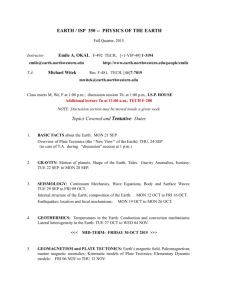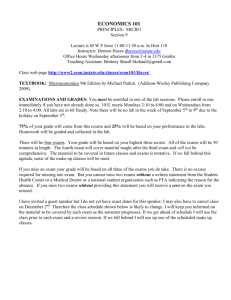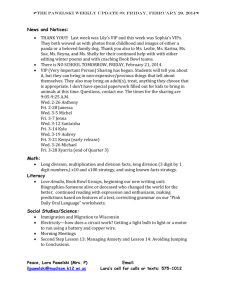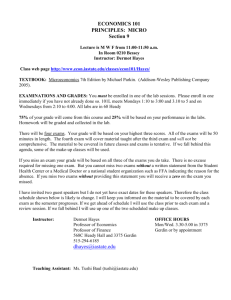Psychology 100-04 – General Psychology
advertisement
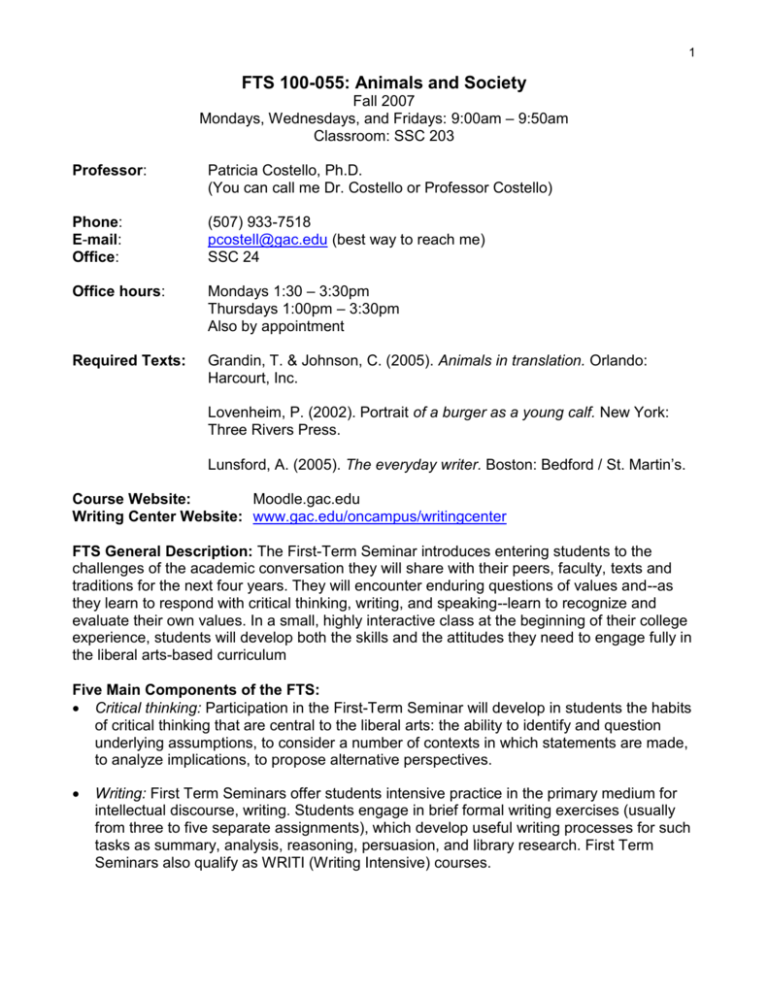
1 FTS 100-055: Animals and Society Fall 2007 Mondays, Wednesdays, and Fridays: 9:00am – 9:50am Classroom: SSC 203 Professor: Patricia Costello, Ph.D. (You can call me Dr. Costello or Professor Costello) Phone: E-mail: Office: (507) 933-7518 pcostell@gac.edu (best way to reach me) SSC 24 Office hours: Mondays 1:30 – 3:30pm Thursdays 1:00pm – 3:30pm Also by appointment Required Texts: Grandin, T. & Johnson, C. (2005). Animals in translation. Orlando: Harcourt, Inc. Lovenheim, P. (2002). Portrait of a burger as a young calf. New York: Three Rivers Press. Lunsford, A. (2005). The everyday writer. Boston: Bedford / St. Martin’s. Course Website: Moodle.gac.edu Writing Center Website: www.gac.edu/oncampus/writingcenter FTS General Description: The First-Term Seminar introduces entering students to the challenges of the academic conversation they will share with their peers, faculty, texts and traditions for the next four years. They will encounter enduring questions of values and--as they learn to respond with critical thinking, writing, and speaking--learn to recognize and evaluate their own values. In a small, highly interactive class at the beginning of their college experience, students will develop both the skills and the attitudes they need to engage fully in the liberal arts-based curriculum Five Main Components of the FTS: Critical thinking: Participation in the First-Term Seminar will develop in students the habits of critical thinking that are central to the liberal arts: the ability to identify and question underlying assumptions, to consider a number of contexts in which statements are made, to analyze implications, to propose alternative perspectives. Writing: First Term Seminars offer students intensive practice in the primary medium for intellectual discourse, writing. Students engage in brief formal writing exercises (usually from three to five separate assignments), which develop useful writing processes for such tasks as summary, analysis, reasoning, persuasion, and library research. First Term Seminars also qualify as WRITI (Writing Intensive) courses. 2 Speaking: First-Term Seminars offer all students a small, discussion-oriented class and acquaint them with college as a place for active participation in discussion. Students will also make brief formal presentations. Values: First-Term Seminars encourage students to reflect on the values inherent in a particular body of knowledge, to recognize the social, moral and ethical implications of that knowledge, and to move toward intellectual, emotional and relational commitments. Advising: First-Term Seminars serve as first-year advising groups. Faculty will help students plan coherent general education programs, advise them in exploring possible majors, and direct them to advisors in their proposed majors as necessary. First-Term Seminars could also appropriately encourage students to see that the College has concern for more than required courses and grades by engaging the class in discussion of campus events and issues. Animals and Society Course Description: This course explores the spaces that animals occupy in human social and cultural worlds and the interactions humans have with them. Central to this course will be an exploration of the ways in which animal lives intersect with human societies. We will spend some time talking about animal-related careers complimented by a veterinarian visit and a K9 visit. This course also provides an opportunity to explore in greater depth some issues related to the exploitation and the liberation of animals. We will examine the phenomenon of keeping animals for entertainment purposes. We will also examine the phenomenon of killing animals for food, considering some of the justifications made for these practices. We will also discuss animal activism and other related issues such as farming, exotic pets, breeding and puppy mills. Course Goals: Develop critical thinking skills Discern your values and ethics surrounding controversial topics Enhance and expand written communication skills Increase oral communication skills Course Objectives: Develop an appreciation for animals and their role in our society Be able to speak intelligently about animal-related issues Be inspired to become active in animal-related community events Attendance: Attendance and participation are part of your overall grade. Attendance will be taken daily. Please let me know if you anticipate missing class. On work submitted late: All work is expected to be handed in on time. Late work will lose 10% of the assignment's credit point value starting after the class period ends. Each day late beyond that will reduce the value by 10%, etc. All assignments are due IN CLASS. Assignments are considered to be late if they are handed in or emailed after class ends. Accommodating Disabilities: Students with documented disabilities are invited to see me as soon as possible to discuss your needed accommodations. Students without documented 3 disabilities who feel they may have difficulty with this course also are invited to see me to discuss what we can do together to help you succeed. Course Methods: Lectures – A small part of class time will be used to present lecture material to elaborate on the readings. Discussion – Most of the class will be conducted in a discussion format. Some days a student will be picked to lead discussion, other days random students will be called upon to contribute. A lot of the discussion will take place in small group format. Discussion topics and methods will vary to keep things interesting! Course Grading Details: Exams: There are two exams, both take home. Each exam is worth 15% of your grade (for 30% total). Attendance and Discussion: Together, both active contribution to discussion and attendance count 10% towards your final grade. Research paper: More information to follow in class. There are three components of the research paper: rough draft (5%), peer review (5%) and the final, updated paper (20%) for a total of 30% of your grade. Oral presentations: There are two oral presentations. The first one is an informal introduction of a classmate. The second is a formal presentation of your research paper (10% total). All other assignments and papers: this includes in class writing assignments, library assignments, short response papers, Nobel paper, and other misc assignments. In total, they are worth 20% of your grade. GRADING SUMMARY Exams (2): Attendance and discussion: Research paper: Oral presentation: Other assignments: 30% 10% 30% 10% 20% Grand Total: 100% BASIC GRADING SCALE (%) A 93-100%, A- 90-92%, B+ 87-89%, B 83-86%, B- 80-82%, C+ 77-79%, C 73-76%, C- 70-72%, D+ 67-69% D 60-66%, F <60 Points are awarded for all assignments and converted to the percentages discussed above. 4 Student Academic Conduct: Every student is expected to act responsibly and honestly. Misconduct is considered sufficient grounds for the designation of a failing grade in the course. Examples of misconduct include but are not strictly limited to the following: Copying answers from another student’s exam paper during an examination. Permitting another student to copy your answers. Consulting notes of any sort during a closed book examination. You will receive a “0” on the exam or quiz if you are caught cheating You should be familiar with and abide by the Gustavus Adolphus College Honor Code (see: http://www.gustavus.edu/deanofstudents/gustavusguide/honorcode.pdf ) 5 Course Schedule (Subject to change) Date Topic Readings/Assignments Due Course introduction / Class interviews Meet the class; How animals perceive the world Mon Sept 10th Animal feelings Chapter 1 “Animals in translation” Ch 2 “Animals in translation”; Oral presentation of classmates Ch 3 “Animals in translation” Wed Sept 12th Animal aggression Ch 4 “Animals in translation” Read “A case study of pit bull owners” and “Troublemakers” Mon Sept 17th Animal aggression / Discuss library visit Library visit Wed Sept 19th How animals think Fri Sept 21st Career Center Visit Read Ch 6 “Animals in translation” Meet in Career Center Wed Sept 5th Fri Sept 7th Fri Sept 14th Mon Sept 24th Animal genius Wed Sept 26th “Portrait of a burger as a young calf” “Portrait of a burger as a young calf” Writing tutor visit; writing, info on research paper assignmt No class - Nobel conference “Portrait of a burger as a young calf” Peer Assistants visit Fri Sept 28th Mon Oct 1st Wed Oct 3rd Fri Oct 5th Mon Oct 8th Fri Oct 19th “Portrait of a burger as a young calf” “Portrait of a burger as a young calf” “Portrait of a burger as a young calf” “Portrait of a burger as a young calf” Academic Advising visit Mon Oct 22nd Reading Day – no class Wed Oct 10th Fri Oct 12th Mon Oct 15th Wed Oct 17th Read Ch 7 “Animals in translation” Library assignments due; Read intro, Chapters 1 & 2 Chapter 3 Look through “The Everyday Writer” Research paper topics due; Chapter 4 Nobel assignment due; Chapter 5 Chapter 6 Chapter 7 Chapter 8 Midterms handed out 6 Wed Oct 24th Fri Oct 26th Mon Oct 29th Wed Nov 31st Screening of “Fast Food Nation” “Fast Food Nation” continued “Portrait of a burger as a young calf” finale The Food Revolution & Factory Farming Meet in library basement Meet in library basement; Midterm exams due Chapters 9, 10 & epilogue Fri Nov 2nd The Food Revolution Introduction, Ch 9, Factory Farming handout; Reaction papers to the movie due Chapters 11 & 12 Mon Nov 5th Dining services visit Centers visits papers due Wed Nov 7th Individual advising meetings Fri Nov 9th Individual advising meetings Mon Nov 12th Individual advising meetings Wed Nov 14th Baker Lawley visit Meet in my office at designated time Meet in my office at designated time Meet in my office at designated time Read “Shooting an elephant”; Elephants Read “An elephant crack up?” Mon Nov 19th Careers with animals Rough draft of papers due; Readings on Moodle Wed Nov 21st No class - Thanksgiving Fri Nov 23rd No class - Thanksgiving Fri Nov 16th Mon Nov 26th Animal research Wed Nov 38th Animal research Fri Nov 30th Pets Mon Dec 3rd Peer reviews in class Wed Dec 5th Pets Fri Dec 7th Oral presentations Mon Dec 10th Oral presentations Wed Dec 12th Oral presentations Fri Dec 14th Read “Systems of meaning in primate labs”, other PETA, ALF, animals rights Read “Anthropomorphism & the human-pet relationship”; Dog essay Research thesis mini paper due Peer reviews due; Puppy mills Wrap up day Final exams due Final papers due (bring to my office by 10am) Final papers due



